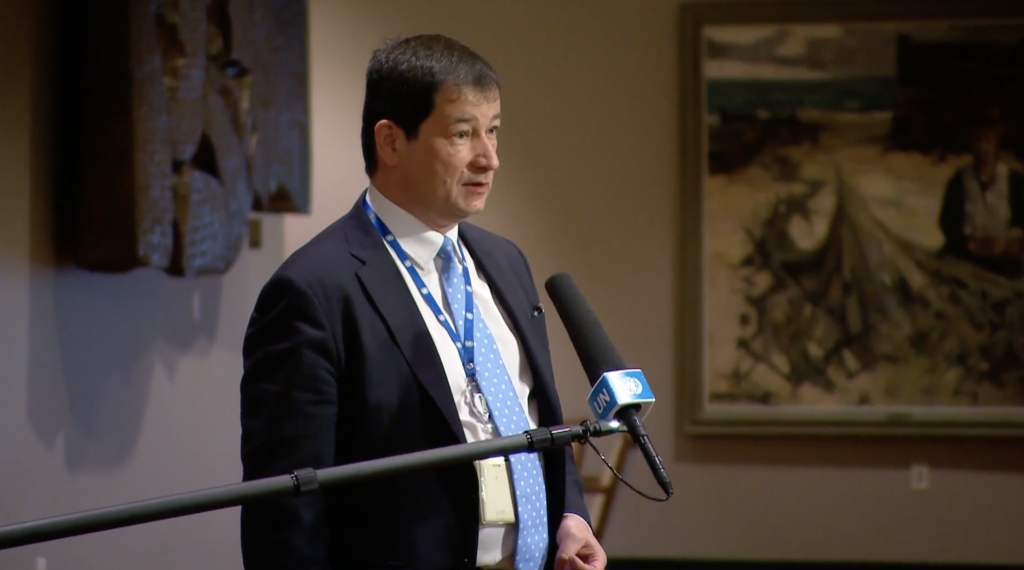Remarks to the Press by First Deputy Permanent Representative Dmitry Polyanskiy following Security Council's AOB discussion
Dmitry Polyanskiy: Hello everybody. I just wanted to draw your attention to the fact that today in the “Any other business” section our European colleagues decided to raise the issue of the situation in Georgia, which is quite strange. I hope they are not meaning situation in the state of Georgia, but the situation in the Caucuses. That's likely to be this situation. But actually, the situation in the Caucuses is very stable. We don't have any reasons to raise this issue unless we are big fans of history. We are also fans of history. So maybe we'll also find something in the books that would be interesting to discuss at the Security Council within the time frame of the UN's existence, if it's okay. But coming back to the situation in Georgia since they decided to raise it and to highlight it, I can tell you that on the 8 August 2008, as you as you know, there was a terrible provocation of Mikheil Saakashvili regime in Georgia which resulted in immense problems for this country and the emergence of two independent republics. Since then the regime has changed and the current leaders of Georgia have already given their own assessment to what has happened then.
They recognize this reckless mistake that was made by Mikheil Saakashvili. They also are very much aware of the role of foreign powers in this situation. The only change that has happened during this year or half a year, is that the Western countries have blocked the Geneva international discussions which embraced Russia, Georgia and two independent republics. But this was not our choice. Of course, this will not contribute to the resolution of situation. But we don't think that this makes the situation in the Caucuses less stable. I would just wanted to register our surprise. The only reason to raise this issue is to kind of try to make Russia uncomfortable, which is not the case. We have a lot of things to say, and believe me that during this AOB, which is behind the closed doors, we announced a lot of criticism to our Western colleagues, much more than they find for us.
Q: Is there anything that the Security Council can do or that you would like to see them do in Georgia?
A: In Caucuses, not in the state of Georgia? Yes? I hope. I think that the Security Council should draw the conclusions of what the intervention or meddling of foreign powers like United States and the block of NATO can lead to in terms of the situation in the country. Georgia is a little bit past this terrible period. There's another country, Ukraine, where the Zelenskyy regime has also fallen in the same trap. Let's look at what will become out of this for Ukraine. But I think that's the only similarity that I can draw between these two situations. And I think that the Security Council should be very much cognizant of these traps and of this behavior of Western countries.
Q: Six months after the military operation in Ukraine. How do you evaluate the results of this military operation so far?
A: The goals have been clearly declared and they are being implemented with the pace that allows us to save manpower and to save the lives of civilian population, as it was repeatedly said by our President and my Foreign Minister. The pace could have been quicker, but that would mean more casualties. That's something that we want to avoid. The objectives are being implemented. It's demilitarization and denazification of Ukraine and of course, ensuring peace and stability for Donbas, which faced Ukrainian shellings and constant killing of civilian populations for eight
Q: Are you expecting a team from IAEA to reach a nuclear plant very soon and what are the difficulties so far?
A: There are no difficulties whatsoever on our side. We were, from the very beginning, very much favorable of such a visit, as far as I am informed, the technical details are now being worked over with Russian side as well as with the Ukrainian side. I know that Ukrainian side creates certain problems for this visit, as it was on the first occasion. But I think you should better address this question to the Ukrainian side and to the UN side. Russian side is very much open and as it was said by Ambassador Nebenzia last week that we expect this visit to take place before the end of August.
Q: Chinese Ambassador this morning told us that the visit of members of Congress to Taiwan is a kind of provocation. Do you agree with this statement?
A: I'm not Chinese Ambassador, sorry, and Taiwan is an inseparable part of China. I don't think it's polite for me to comment on this issue.
Q: It’s the anniversary of the US withdrawal from Afghanistan. This morning we also asked about the release of the frozen assets from several countries. What's your opinion on this issue?
A: Well, we repeatedly said that the frozen assets from Afghanistan should be released for the benefit of the Afghan people. As for the anniversary of United States fleeing from Afghanistan, I think we will have several opportunities this month maybe to look into this issue deeper and to evaluate what are the consequences of this for the country and for the world.
Thank you.
